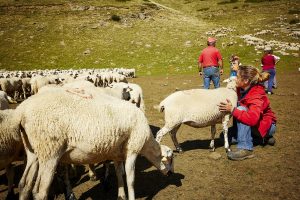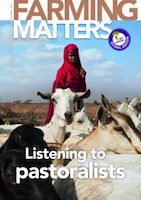Maintaining a pastoralist’s way of life requires tenacity. From transhumant beekeepers in Mexico to new peasants in Europe, these are stories of pastoralist-led initiatives that challenge marginalisation in political processes.
Catalonia

Shepherd school
While it is true that pastoralism is increasingly revalorised across Europe, the number of flocks and shepherds in the region remain low. For a great part, this is due to the lack of economic opportunities for rural youth, who opt for other livelihood strategies. To address this problem, a handful of initiatives seek to facilitate generational renewal by providing future pastoralists with the support and training they need. One of these initiatives is the Escola de Pastors de Catalunya, a shepherd school created in 2009. The school’s objective is to support new peasants interested in pastoralism and to show that peasant agriculture is economically viable. The course lasts one year and includes theoretical and practical modules. At the school, apprentices spend time acquiring theoretical knowledge that ranges from animal breeding to renewable energies and from botany to conflict resolution. Moreover, they gain practical experience by attending seminars and working alongside veteran shepherds. After developing technical and managerial skills, shepherds may choose to settle as livestock farmers or as transhumant shepherds. Another problem facing new peasants is access to land. To tackle this problem, the school works closely with Terra Franca, a non-profit born in 2013, that brings together land owners and new peasants under common agroecological projects.
For more information contact Escola de Pastors (info@rurbans.org).
Niger

Informed choices
Communities in North Dakoro, Niger, face increasingly unpredictable weather triggering emergencies, and a reduction in pasture and water availability. This situation that puts pastoral livelihoods in danger is due to the impacts of climate change and an increasing herders’ population (largely due to conflicts in neighbouring countries). The community has implemented SCAP (Systèmes Communautaires d’Alerte Précoce). It is a communitybased Early Warning System developed with the support of CARE. Community members collect, share and analyse relevant indicators and information that helps herders to cope with the unpredictable circumstances. Information concerning rainfall patterns, availability of water and pasture, opening dates of fields, the location of annual festivals, prices of goods and animals in local markets, or the existence of possible epidemics are collected. The information is transmitted through mobile phones that are charged using community managed solar panels. Pastoralists are now able to make more informed choices, taking action when an emergency is announced, or predicted. For example, when a bad season is announced and a shortage of pasture expected, pastoralists can reduce their herds by selling some animals before it’s too late, and using the income to buy food and medical products for the rest of the herd.
For more information contact Hiya Maidawa (mhiyamaidawa@ gmail.com).
China

Tibetan herders diversify their options
In 2010, the Kegawa Herders Cooperative was established in a Tibetan pastoral region of Qinghai Province, China. Following decades of centrally-planned development, this was the first time in many years that local community members had come together for a common purpose on a purely voluntary basis. They began to develop a range of creative ways to advance community interests based on local resources and knowledge. The government quickly recognised the value of this grassroots initiative. Now with over 90 families as members, the cooperative produces and sells livestock-related products which provide employment and generate income for the community. This ‘coop’ approach is now upheld by the government and favourable policies support its replication. Through such community-level governance of natural resources, new economic opportunities have been identified and maximised (for example, the sale of yak wool for production of high-quality thermal clothing), and now there is more collaboration amongst pastoralists. Equally, environmental monitoring occurs regularly – including of wildlife, grasslands, and glaciers – and climate awareness and environmental conservation (including the charismatic snow leopard) are new trademarks for these Tibetan herders. Moreover, pastoral voices are heard more effectively and widely than before, social cohesion and empowerment are increasing, and new opportunities are being trialed and demonstrated. People’s sense of identity is also being restored and strengthened, with increasing pride in Tibetan cultural heritage and in pastoral livelihoods.
For more information contact Dr. J Marc Foggin (foggin@plateauperspectives.org).
Mexico

Sailing to pastures new
Transhumant beekeeping is not the first thing one thinks of when talking pastoralism. Yet, mobile beehives are common practice in modern apiculture. Like most pastoralist societies worldwide, transhumant beekeepers face many obstacles that challenge their livelihoods and lifestyles. In Mexico, many beekeepers are looking for ways to extend the usually short blossom period and they do so by looking for new pastures for their colonies. Beekeepers in the coastal state of Veracruz have extended their niche to mangrove forests, which they reach by motor boats. The success of producing honey this way has become such, that fishermen in other states in the Gulf of Mexico have started adopting mobile apiculture as well. With the support of researchers from ECOSUR, experienced beekeepers train fishermen in beekeeping in a farmerscientist partnership that started in 2012. With this move to new pastures, everybody wins. Fishermen have an alternative source of income and transhumant beekeepers reach local markets thanks to the advisory support of ECOSUR, which helps raising awareness amongst consumers who usually don’t eat honey. Moreover, researchers observe how beekeeping, once again, contributes to local economies and conservation of fragile ecosystems.
For more information contact Rémy Vandame (remy@ ecosur.mx)

